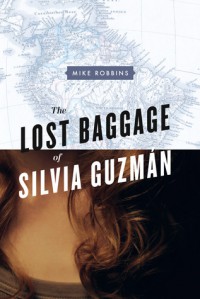The Lexical Funk!
Daniel has wanted to be a writer ever since he was in elementary school.He has published stories and articles in such magazines as Slipstream, Black Petals, Spindrift, Zygote in my Coffee, and Leading Edge Science Fiction. He has written four books: The Sage and the Scarecrow (a novel), the Lexical Funk (a short story collection), Reejecttion (short story/ essay collection), and The Ghosts of Nagasaki (a novel).
Micro-Interview - Mike Robbins (The Lost Baggage of Silvia Guzmán)

I recently had the pleasure of finishing Mike Robbins's excellent book, The Lost Baggage of Silvia Guzman. As a result I decided to do a short interview with him for this blog.
You can check out The Lost Baggage of Silvia Guzmán here:
https://www.amazon.com/Lost-Baggage-Silvia-Guzm%C3%A1n/dp/0991437403/
I hope you enjoy.
How have your travels impacted how you write and what you think of writing?
They have had an immense impact on what I write, I think, more than how I do it. For a start, living in poorer countries makes you less comfortable about the world. It also had an effect on my politics; I was in Ecuador for some months in 1991 and was aware that people there worried about being sucked into the violent drug economy that Colombia was fighting at the time. It made me ask whose fault that trade really was, and that partly drove The Lost Baggage of Silvia Guzmán, which I wrote later that year – though it wasn’t to be published for many years.
But also, living in places such as Bhutan showed me that some very basic assumptions are not always shared. One example is the belief in the Judaeo-Christian world that you only walk the world once; but really, why should that be so? What is the life force that drives us, and does it survive us? This came out in my most recent book, Dog!
As to what I think of writing itself, I’m not sure. Being out and about in the world made me want to be engage with broader issues. But I don’t have an opinion on what others should write. If someone wants to write a novel about the failure of one marriage, or a piece about a spider’s web in the sunlight, they should.
What’s your favorite sentence or paragraph from one of your books? What does it mean to you?
“Outside, in the Vicar’s garden, the first leaf, a freak perhaps, de¬tached itself weeks early and fluttered its way to the ground like the fragments of a letter that Paul took from his pocket on a sunny Sunday fifty years later and tore into strips, then smaller strips, then smaller yet until nothing of its substance could be divined.”
This is from my second fiction book, Three Seasons. It’s a collection of three novellas set in England, and the paragraph is from the last of the three; it is about a moment in someone’s life when the distant past suddenly illuminates the present, so that he changes his mind about a step he was about to take. Three Seasons is the most personal thing I’ve written, in which I expressed my feelings about my own country, which I had just left.
What advice would you give other indie authors starting out?
That is hard, isn’t it – everyone is so different! I suppose I would say that they should write what their gut tells them to write, not what they or someone else thinks they should be writing. There are exceptions to that, of course. If you’re writing a genre book – say, a Regency bodice-ripper – you’ll need to know what your audience wants. There’s nothing wrong with that; writing for a market takes real craftsmanship. But the very best books don’t get written that way; they happen because the writer had something they wanted to get down on paper, for their own reasons, in their own way. You couldn’t write Ulysses to order!
What are your writing quirks and habits?
Basically, I need fewer quirks and better habits. I have a problem concentrating, and tend to graze the internet too much when I should be writing. I also have a job that I am lucky to have, and which has to take priority. I should really make myself write a minimum number of words every day as soon as I get home, even if it is rubbish. Kingsley Amis always did 500 words in the morning, knowing that he would probably hit the sauce at lunchtime.
What's children's cartoon best represents your personality?
Now and then I sort of identify with Brian, the dog in Family Guy. Though I sound much more like Stewie. In fact his accent’s so like mine I could do the voiceovers.
What question would you like to see in future interviews?
Why not ask a writer whether a landscape or cityscape has influenced them?



